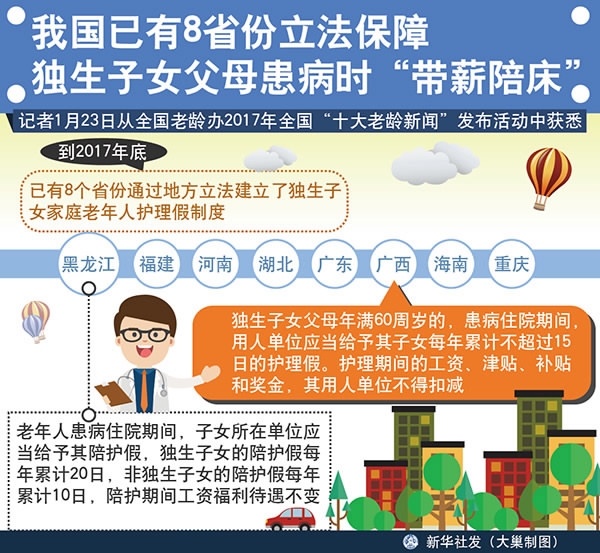
China
20:21, 24-Jan-2018
Paid elder care leave legislated in eight Chinese provinces
CGTN

Since the end of 2017, 8 provinces in China including Heilongjiang, Fujiang, Henan, Hubei, Guangdong, Hainan and Chongqiong in China have enacted paid family leave as a province administered benefit.
In the Guangxi Zhuang Autonomous Region in southwest China, an only child is allowed to take up to 15 days leave each year if his or her parents are over 60 and in the hospital. Employees' salaries, allowances and bonuses will not be reduced while taking leave.

The National Committee on Aging also released a chart to illustrate the legislation. /Xinhua photo
The National Committee on Aging also released a chart to illustrate the legislation. /Xinhua photo
The one child policy was introduced to China in 1979. 30 years later, parents who followed the policy are now aged and the children from these families eventually became carers.
As a result, care for the elderly has become a challenge for families, companies and even the government.
According to statistics from Xinhua News Agency, there were 230 million people age 60 or older in China at the end of 2016, accounting for 16.7 percent of the total population. About 51.3 percent of the elderly were "empty-nesters," who don't live with their children.
In Chinese culture, because of the Confucian philosophy of Filial Piety, children have to respect and take care of the parents and elders in their family.
Even though the family size is shrinking due to the one child policy and lifestyles are changing, care and support for elders is still one of the most important values in Chinese society.
This is a contrast to modern Chinese culture and family structures, as what bothers millennial parents and their families is how to take care of their children.
As this generation has grown into parenthood, a majority of children are now being raised in families where both of their parents work, and paid family leave is only offered to roughly 14 percent of those.
To meet the needs of the modern workforce, companies like Lyft, Starbucks and Walmart, recently expanded the amount of time its workers will be able to take as paid family leave.
“It’s another indication in the growing sense that it is time for the US to have national paid leave,” said Vicki Shabo, vice president for workplace policies and strategies at the National Partnership for Women and Families. “It’s obviously beneficial to workers, it’s something that is beneficial to employers, and it will be beneficial to the US economy.”

SITEMAP
Copyright © 2018 CGTN. Beijing ICP prepared NO.16065310-3
Copyright © 2018 CGTN. Beijing ICP prepared NO.16065310-3